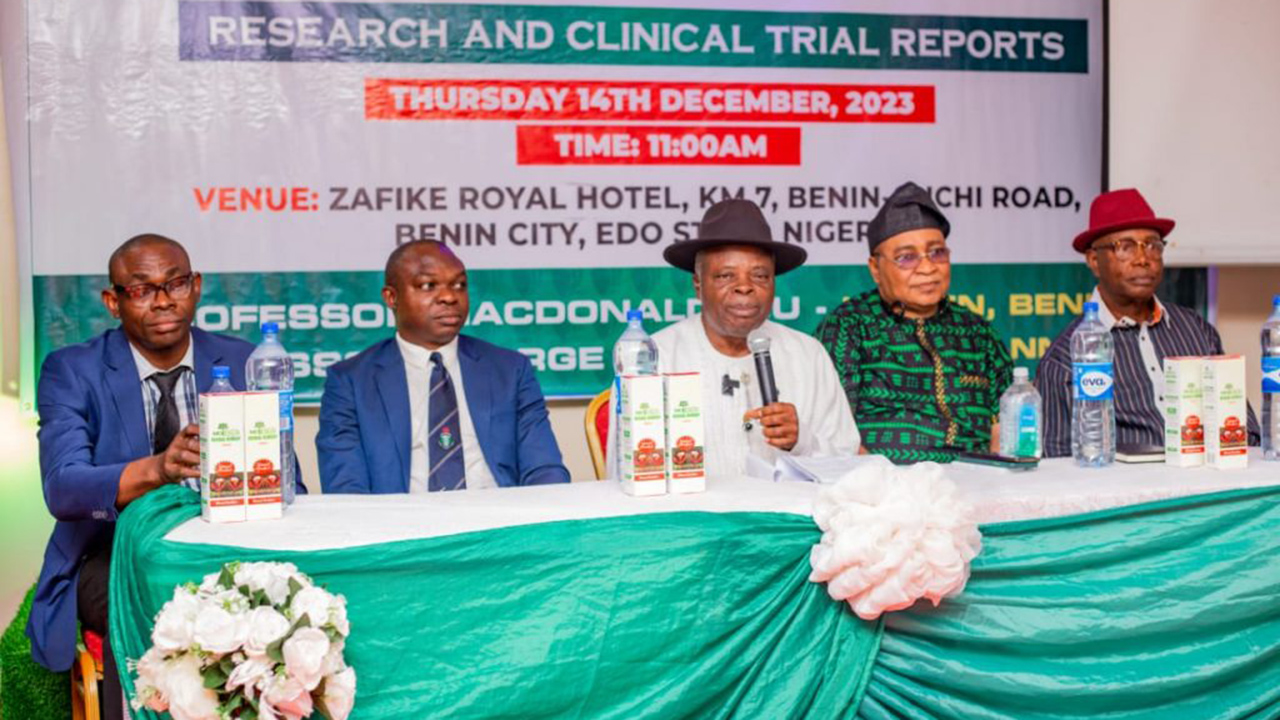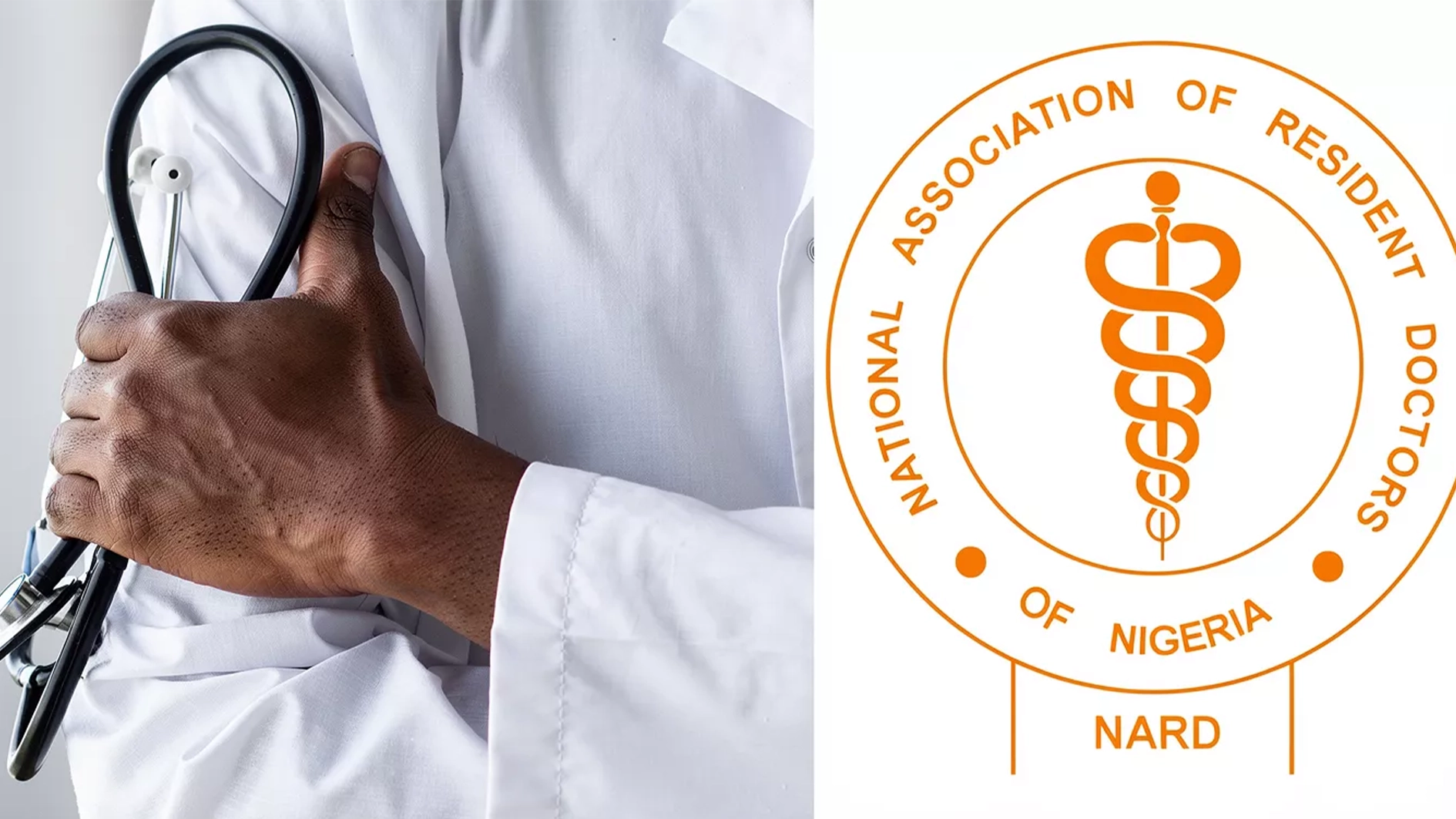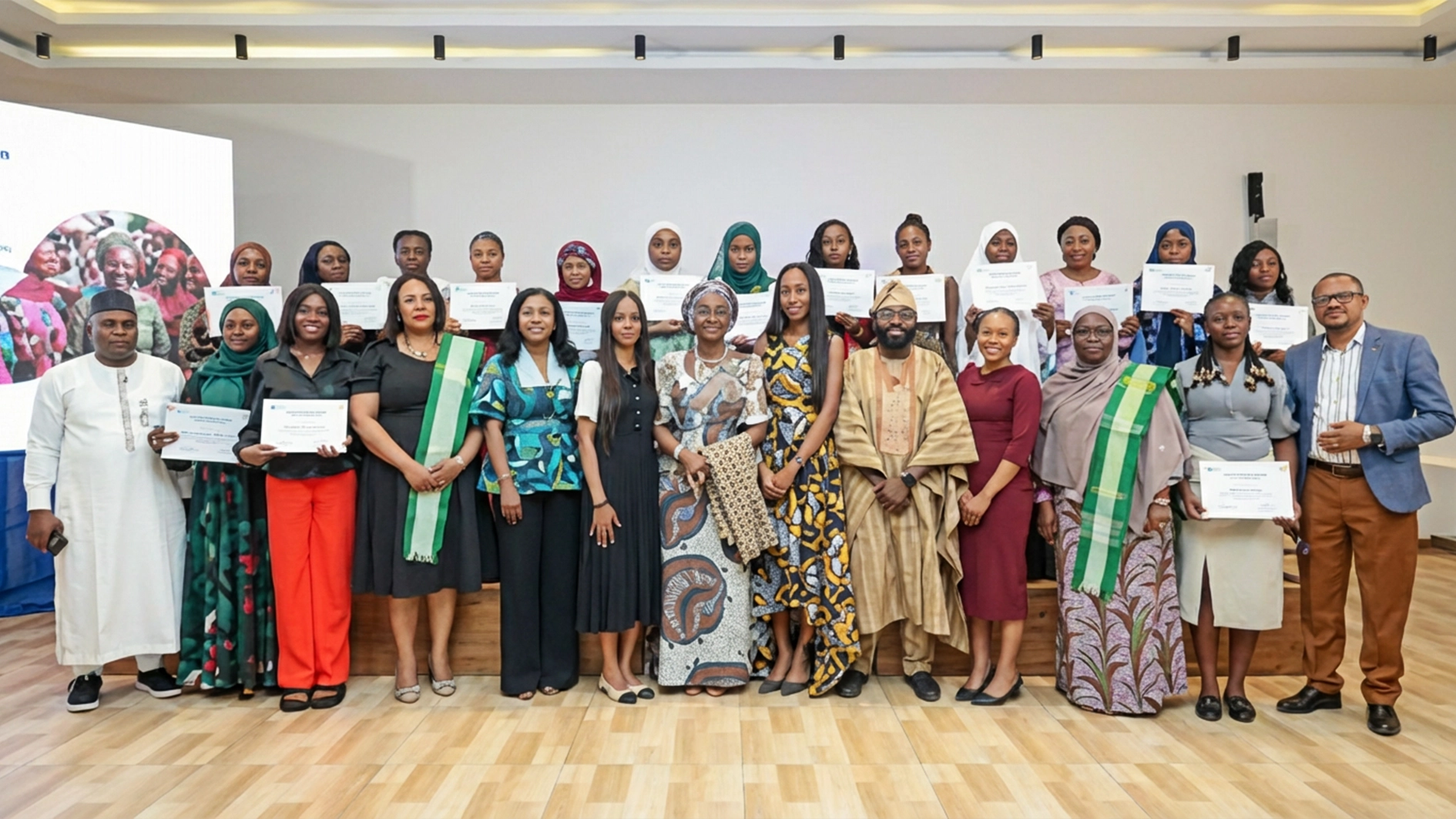
Clinical trials have validated the efficacy and safety of innovative herbal mixture, Mojeaga, as a blood tonic, immune booster, nutritious ‘food’ and aphrodisiac.
Aphrodisiacs are foods and herbs that are thought to get one in the mood for lovemaking, to increase sex drive, induce erection or beat erectile dysfunction. The word comes from the name Aphrodite, the Greek goddess of love. Foods like chocolate, avocado, almonds, cinnamon, pepper, and dates are thought to be aphrodisiacs.
The clinical trials of Mojeaga Herbal Remedy were presented to the public last week, at a virtual and physical press conference, in Benin City Edo State.
The researchers that conducted the clinical trials at different sites/teaching hospitals include: Prof. MacDonald Idu of the Department of Plant Biology and Biotechnology, University of Benin, Benin City, Edo State; Prof. George U. Eleje, Deputy Director Research and Innovations, Nnamdi Azikiwe University (NAU) Awka /Nnamdi Azikiwe University Teaching Hospital (NAUTH), Nnewi, Anambra State and a trado-medical practitioner, Managing Director of Mojeaga International Ventures Limited, Monday Ojeaga Alugeh.
Others are: Prof. Matthew Ikhuoria Arhewoh of the Department of Pharmaceutics and Pharmaceutical Technology, Faculty of Pharmacy, University of Benin, Edo State, and Dr Peter Emuchay, Chief Medical Director of Cedio Medical Nigeria, Calabar, Cross River State, and immediate past Chairman, Medical Advisory Board of Hemptonics, United States of America (USA).
The researchers called on the Federal Government to support trado-medical practitioners with grants to enable them carry out research and complement the medical profession.
Idu, in a study presented at the press conference, titled: ‘Evaluation of Mojeaga Herbal Remedy: Nutritional, Biosafety, Haematinic and Aphrodisiac’, which was done in collaboration between Phytomedicine Research Laboratory and Mojeaga Herbal Remedy Nigeria Limited, concluded: “The following are the conclusions of these research findings on the Mojeaga herbal remedy; elucidation of non-nutritional and nutritional research findings on the product with appreciable quantity. The bio-safety profile of acute or chronic administration of the product with less or no adverse effect based on the understudied doses. Anti-anaemic efficacy of Mojeaga herbal remedy as its therapeutic focus was certified. Establishment of the aphrodisiac potential of the product with the relaxing effect of penile smooth muscles.”
Haematinics are substances that are essential to the proper formation of the components of blood. Examples of haematinics include folic acid, vitamin B12, and iron. In addition, vitamin D, which helps maintain the health of bones—the reservoirs of new blood cells—may also have a… have a role in protecting haemoglobin and in stimulating the formation of new blood cells.
Anaemia is a problem of not having enough healthy red blood cells or hemoglobin to carry oxygen to the body’s tissues. Haemoglobin is a protein found in red cells that carries oxygen from the lungs to all other organs in the body. Having anaemia can cause tiredness, weakness, and shortness of breath.
Idu said the natural cure, known as Mojeaga, is a mixture of extracts of Alchornea cordifolia (Ubebe in Igbo; Ipan-esin in Yoruba; Bombana in Hausa), Pennisetum glaucum (pearl millet or gero in Hausa) and Sorghum bicolor (Guinea corn; Soro in Igbo, Dawa in Hausa and Okababa in Yoruba).
“Alchornea cordifolia is a well-known African herb with a long history of useful therapeutic uses. It is used to treat bacterial, fungal, parasitic, and inflammatory disorders.
“The bark from the root and stem is used to treat jaundice, while the leaves are used to treat cuts, ulcers, wounds, diarrhoea, sores, leprosy, gastrointestinal, urinary conditions, antidote to snake venom, treat eye, pigmentation problems, fever, rheumatic discomfort, and malaria. The bark, roots, seeds, and leaves of the stem can be used to cure diabetes and induce labour.
“Sorghum bicolor seeds are used to treat cough, gonorrhoea and jaundice. The red pigment in sorghum exhibits antimicrobial effects against bacteria and fungi and to treat anaemia.
“Additionally, sorghum seeds are utilised as a remedy for diarrhoea, to treat anaemia, to manage various menstrual issues, a potent anti-inflammatory and immune-modulating effect, ant-sickling, enhanced haematological parameters, and other favourable health effects.
“Pennisetum glaucum, with its high fibre content utilized to alleviate constipation, diabetes, maintain a low glycemic index, increase haemoglobin levels, treat respiratory conditions like asthma and bronchitis,” he said.
Idu said medicinal plants comprise vital compounds implicated in developing effective therapeutic agents. He said approximately 80 per cent of the people in developing countries depend solely on alternative medicine as a primary source of health care.
He said herbal drugs derived from plant materials entail the application of complete plant parts or fractions or polyherbal plants for the management and treatment of diseases.
Idu said the Phase 1 of the clinical trials on toxicity found non-nutritional constituents such as alkaloids, flavonoids, and steroids appear to be more abundant in Mojeaga herbal remedy from the preliminary phytochemicals having several therapeutic properties implicated in the product (analgesic, anti-inflammatory, sexual activities, anticancer, cardiovascular disease, and antimicrobial property). He said the antioxidant of Mojeaga herbal remedy showed the scavenging effect of the product against oxidation acquired due to stress.
The professor of phytomedicine said the nutritional evaluation of the Mojeaga herbal remedy elicited an increase in fibre, carbohydrate, proteins, linoleic and oleic acid, calcium, magnesium, sodium, vitamins A, C, and E, glutamate, and aspartate for the management and treatment of diverse diseases (treatment of constipation, diarrhea, brain enhancer and functioning, immune boosters, cholesterol regulation, blood volume, eye enhancing effect) associated with the product efficacy.
Idu said the toxicological evaluation of Mojeaga herbal remedy involving phase I and II acute toxicity with less or no adverse effect at reduced doses except at 10 g/kg that elicited morbidity and mortality when compared with the control.
He said the chronic toxicological study of Mojeaga herbal remedy in male and female animals had no deteriorative effect on the body weight, organ weight, haematology, biochemicals and histopathological parameters of the product, rather showed a protective and therapeutic measured specifically at reduced doses/concentration.
Idu said the Phase II clinical trials of anti-anaemic property of Mojeaga validated the drug as a potent haematinic agent, an increase in the regeneration and rapid maturation of blood cells were recorded from the product at a reduced dose, unlike folic acid, which only facilitates the maturation of already synthesised blood cells.
He said the results obtained from the histological study showed the rapid regeneration and maturation of blood cells via an excitatory effect on the bone marrow (myelo-erythroid cell) and the erythropoietin of renal cells for red blood cell formation.
Idu said the results of the Phase III clinical trials on aphrodisiac properties of Mojeaga herbal remedies showed they are associated with several muscle-relaxing effects, hence, the evaluation of the product on aphrodisiac potential elicited an excitatory effect of the penile smooth muscle, possibly due to the release of nitric oxide or hormonal stimulation associated with the active ingredient of the plant.
He said an increase in libido enhancing effects of Mojeaga herbal remedy were recorded at reduced doses with increased mounting, intromission, and ejaculation frequency and latency with quick onset of action and prolonged sexual activities with no adverse effect.
“Also, an increase in sperm activities and testosterone levels were recorded at a reduced dose when compared with sildenafil citrate,” he said.
Meanwhile, Alugeh described lack of access to grants and government support as the bane of trado-medical practice in the country.
According to him, a lot needs to be done in the trado-medical sector as practitioners are willing to spend to carry out research on herbal medicine that can address some major ailments.
“The challenge in herbal medicine is that most of the practitioners are not certified and the cost of research is very high. In Mojeaga, we have spent all the resources we have to bring out this product to ensure that it is safe and efficacious.
“Research is money consuming and there is no grant anywhere. If the federal government can set up a department that will make research into traditional medicines to be less expensive, it will help practitioners and the nation.”
Speaking on his Mojeaga Herbal Remedy, a product that is sourced and produced in Edo State, he said the product is readily available in many health shops nationwide.
He pointed out that the product, which was registered by National Agency for Food and Drug Administration and Control (NAFDAC) in 2011, is safe and has the efficacy for blood boosting powers.
Eleje and his team of researchers in a paper, titled ‘A Phase II Clinical Trial of Efficacy and Safety of Mojeaga Remedy in Combination with Conventional Oral Iron Therapy for Correcting Anaemia in Obstetric Population’, published in PLoS One journal and presented at the press conference, said Mojeaga herbal remedy, produced by Mojeaga International Ventures Limited Nigeria, is a natural preparation containing free organic oral iron preparation among other nutrients that allows co-administration of conventional haematinics or other iron preparations. He said Mojeaga has been approved under Listing Status by NAFDAC with NAFDAC registration number A7-0996L.
Eleje, who is also a consultant Obstetrician and Gynaecologist, said their clinical trial determined efficacy, safety, and tolerability of Mojeaga remedy as an adjunct to conventional oral iron therapy (standard-of-care) for correcting anaemia in the obstetric population.
Arhewoh said his team is working on Mojeaga Herbal Tea and Mojeaga Herbal Capsule. “It’s undergoing registration by NAFDAC. This will make the supply of products easily accessible to the international consumers,” he said.
Arhewoh remarked that Mojeaga Herbal Remedy, which is sourced and produced in Benin City Edo, is: “Our own”. He encouraged all medical professionals to prescribe Mojeaga Herbal Remedy, with confidence, since it’s confirmed through several studies and clinical trials to be safe and efficacious for treating anaemia.He said the studies on the Tea and Capsule will soon be completed and published.






